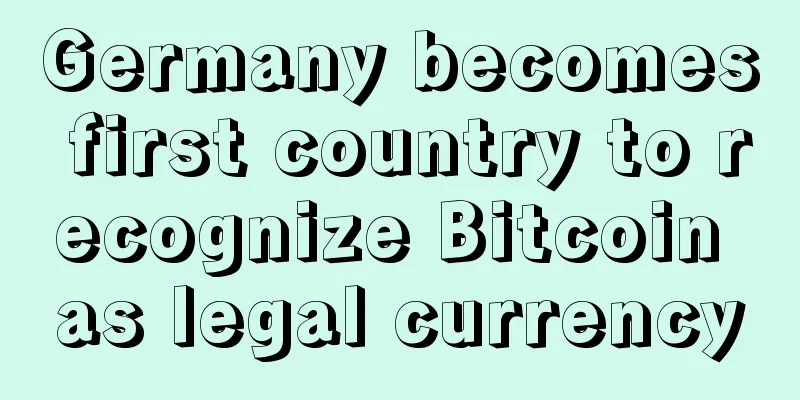Germany becomes first country to recognize Bitcoin as legal currency

|
The German government recently officially recognized the legal "currency" status of Bitcoin. Owners of this currency will be able to use Bitcoin to pay taxes or for other purposes, and the country has become the first country in the world to recognize Bitcoin. According to German local media Die Welt, the German Ministry of Finance has officially recognized Bitcoin as a "currency unit" and "private money", which means that profits from business activities related to Bitcoin will be taxed. However, the newspaper also pointed out that individuals using Bitcoin will still be able to obtain tax exemptions. The German Ministry of Finance reportedly revealed the news in response to an inquiry from Frank Schaeffler, a Merkel ally and a financial expert from the Free Democratic Party. In response, Schaeffler said: "This is the first time that the federal government has recognized Bitcoin as a private asset." In July, Bitcoin Deutschland, which is regulated by the financial watchdog, became the first European bitcoin exchange to establish a direct partnership with a bank, agreeing to work with German Web 2.0 bank Fidor to convert bitcoin into other currencies. In fact, as people's resentment towards traditional financial institutions grows, Bitcoin has become a very popular payment method around the world since its launch in 2009. At the same time, its viability has been questioned by the outside world because it has not been recognized and publicly supported by any government or central bank. In August this year, U.S. District Court Judge Amos Mazzant of Texas ruled in a case involving a Bitcoin virtual hedge fund that Bitcoin is a currency and should be subject to financial regulations. At that time, the defendant in this case, Trendon Shavers, was sued by the U.S. Securities and Exchange Commission (SEC) for operating a "Ponzi scheme" because the institution he established based on "Bitcoin Savings and Trust" (BTCST) accumulated 700,000 bitcoins with a total value of more than US$4.5 million between 2011 and 2012, but suddenly announced its closure in August 2012. After being sued, Shavers tried to avoid prosecution on the grounds that "Bitcoin investment is not a security because Bitcoin is not money and is not regulated by the U.S. government." Although the final ruling of the case has brought Bitcoin's status closer to existing currencies, it has also exposed the weakness of Bitcoin, which deserves more government regulation, which runs counter to the original intention of Bitcoin's invention. In this regard, some supporters say that anonymous Bitcoin can help protect people's identity information and protect them from thieves and credit card fraud groups. But critics say that the lack of regulation of Bitcoin will attract more and more fraudsters, and the currency's unstable exchange rate, supply and limited use are also worrying. Currently, an organization called the Bitcoin Foundation strictly controls the number of bitcoins in the world to around 21 million, and its current exchange rate is as high as US$110 = 1 bitcoin. |
<<: Rumor has it that Bitcoin mining machine service provider ASICME has acquired an ASIC chip team
>>: The truth about Bitcoin investment
Recommend
Will a man with a mole on the corner of his eye become richer?
People who have been carried on their parents’ ba...
What kind of facial features will a woman have for her fate of late marriage?
If a woman marries late, it will actually have a ...
What does it mean if a girl has a mole behind her ear? Will it bring bad luck to her parents?
Moles are common to people, and different moles h...
The market value of new public chains has surged, but on-chain applications are lackluster
2021 is another year of contention among public c...
The worst types of eyebrow shapes that can cause you to lose money
Or many people don’t know that eyebrows are actua...
A detailed review of the entire process of Zhao Dong’s “investigation”: Why is he suspected of “covering up and concealing criminal proceeds”?
On July 2, the news that Zhao Dong, a cryptocurre...
Denial of Service (DoS) Attacks: Miners Make or Break the Game
Abstract: We present a denial-of-service attack o...
Thinking | NFT technology application and legal regulation
Authors of this article: Zhang Feng, partner of W...
Grin mining machines have been put into use, and the current network computing power is 22378Gps
According to BlockBeats, Gary, a former core deve...
What does a woman look like when she is rich and powerful?
Some women want to be rich and powerful. In fact,...
Analysis of the good and bad moles on a woman's face
Traditional physiognomy covers a wide range, among...
Men with non-protruding ears are easy-going and have strong family values.
From the perspective of physiognomy, people with ...
After buying 4,145 bitcoins at the bottom, Justin Sun expressed his views on the current market
Yesterday morning, TRON founder Justin Sun expres...
Jiang Zhuoer: Many of CSW’s words are unreliable, and most of the computing power of the Litecoin mining pool is owned by the company itself
Jiang Zhuoer of the Litecoin mining pool responde...
His eyes reveal his character
His eyes reveal his character The eyes are the wi...









